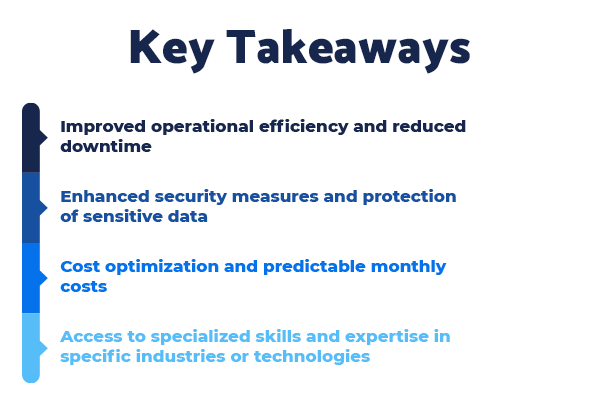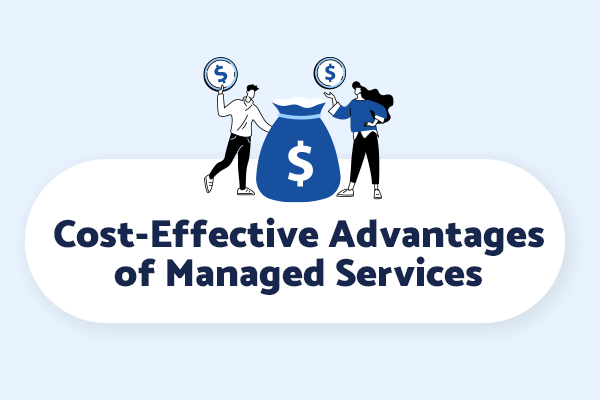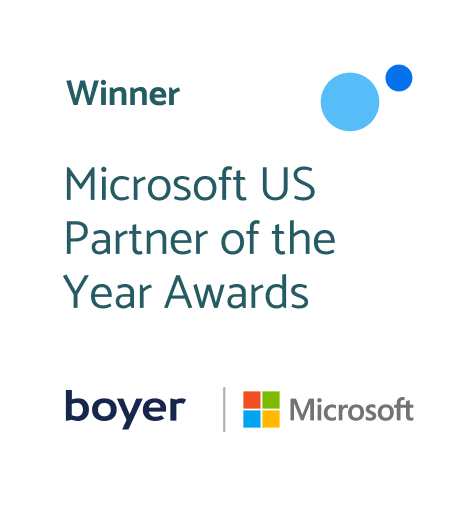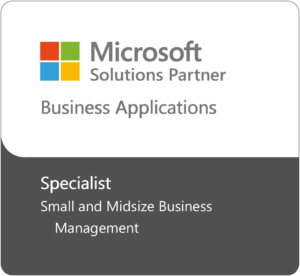In today’s fast-paced business environment, organizations increasingly turn to managed services to enhance their operational efficiency and gain a competitive edge.
According to recent research, companies that adopt managed services experience an average cost savings of 25% while bolstering their cybersecurity measures by 40%.
Moreover, leveraging the expertise of managed service providers enables businesses to focus on core functions and strategic initiatives.
In this article, we talk about the benefits of managed services, including cost savings, enhanced security, and specialized knowledge, through real-world examples.
Key Takeaways

- Improved operational efficiency and reduced downtime
- Enhanced security measures and protection of sensitive data
- Cost optimization and predictable monthly costs
- Access to specialized skills and expertise in specific industries or technologies
Understanding Managed Services
Understanding Managed Services is crucial for businesses looking to leverage the benefits of cost savings, enhanced security, and expert support.
Firstly, it is essential to define what Managed Services entails, which involves outsourcing IT functions to a third-party provider.
Secondly, businesses must familiarize themselves with different Managed Services models, such as fully managed, co-managed, or on-demand services, to determine the most suitable option for their needs.
Lastly, making an informed decision when choosing a Managed Services provider is vital, considering factors like reliability, scalability, and expertise in specific industries or technologies.
Defining Managed Services
Managed services can be defined as the outsourcing of specific IT functions to a third-party provider, allowing businesses to leverage external expertise and achieve cost savings.
By choosing managed services, organizations can offload the responsibility of managing and maintaining their IT infrastructure, applications, and security to a dedicated team of professionals. This allows businesses to focus on their core competencies while benefiting from the specialized knowledge and experience of the managed services provider.
There are different models of managed services, including fully managed services, where the provider takes complete responsibility for the IT environment, and co-managed services, where the provider works alongside the internal IT team.
Understanding the different managed services models and choosing the right one for a specific business can lead to improved operational efficiency, reduced downtime, enhanced security, and overall cost optimization.
Managed Services Models
There are various models of managed services that organizations can choose from to optimize their IT operations and leverage external expertise.
When considering managed services pricing, organizations must conduct a benefits analysis to determine the cost-effectiveness of outsourcing IT functions. This analysis involves evaluating the potential cost savings, increased security, and access to specialized skills that managed services can provide.
Additionally, organizations should carefully review and negotiate service level agreements (SLAs) to ensure that the managed services provider meets their specific requirements and guarantees a certain level of performance.
Lastly, successful managed services implementation involves a comprehensive understanding of the organization’s IT infrastructure and goals, as well as effective communication and collaboration between the organization and the managed services provider.
Boyer offers managed service plans that are unique to your business’s needs. Explore the options and talk to our team about managed services for your organization.
Choosing Managed Services
To make informed decisions when choosing managed services, organizations must have a clear understanding of the available options and their specific IT needs. Evaluating options is crucial, as it allows organizations to compare different service providers and determine which ones align with their requirements.
Key considerations include the provider’s expertise, track record, and ability to offer tailored solutions that address specific IT challenges. It is important for organizations to assess their own needs and identify areas where they require external support. This will help them select a service provider that can offer the necessary expertise and resources.
Service provider selection should be based on factors such as reputation, experience, and the ability to provide comprehensive managed services that cover all aspects of IT infrastructure. By carefully evaluating options and considering key factors, organizations can choose managed services that best fit their unique IT requirements.
Cost-Effective Advantages of Managed Services

Managed services offer several cost-effective advantages for businesses.
One of the key benefits is reducing operational expenses. By outsourcing IT functions to a managed service provider (MSP), companies can avoid the costs associated with hiring and training in-house staff, as well as the expenses related to maintaining and upgrading infrastructure.
Additionally, managed services provide budget predictability, allowing businesses to plan and allocate resources more effectively.
Lastly, by leveraging the expertise and experience of managed service providers, organizations can achieve a higher return on investment by optimizing their IT operations and leveraging new technologies.
Reducing Operational Expenses
One of the key advantages of managed services is the reduction of operational expenses through efficient resource allocation. By outsourcing certain tasks and responsibilities to a MSP, businesses can achieve significant cost savings and improve operational efficiency. This cost optimization strategy allows organizations to focus on their core competencies while leaving the management and maintenance of IT infrastructure and systems to the experts.
Here are three ways in which managed services help reduce costs and improve expense management:
- Access to Economies of Scale: MSPs have the expertise and resources to efficiently manage IT operations for multiple clients, allowing them to leverage economies of scale. This reduces costs for businesses as they no longer need to invest in expensive infrastructure, software, and skilled personnel on their own.
- Proactive Monitoring and Maintenance: MSPs employ proactive monitoring and maintenance practices to prevent potential issues and minimize downtime. By regularly monitoring systems and identifying and resolving problems before they escalate, managed services can help businesses avoid costly disruptions and unplanned expenses.
- Predictable Monthly Costs: Managed services typically offer a predictable monthly pricing model, which allows businesses to budget and plan their expenses more effectively. Instead of dealing with unpredictable and fluctuating costs associated with in-house IT management, organizations can have greater control over their expenses and allocate resources more efficiently.
Budget Predictability
Budget predictability is a key advantage of managed services, ensuring cost-effective advantages for businesses. By opting for managed services, organizations can benefit from predictable expenses, which contribute to financial stability and efficient budget management.
With managed services, businesses can have a clear understanding of their monthly or annual costs, allowing them to plan and allocate resources effectively. This predictability in expenses helps organizations maintain financial stability and avoid unexpected financial burdens.
Furthermore, managed services enable businesses to have better cost control by providing them with a fixed monthly fee for services rendered. This allows businesses to optimize their budget and allocate resources more efficiently, ultimately leading to improved financial management and overall cost savings.
ROI Increase
By leveraging managed services, businesses can experience an increase in return on investment (ROI) due to the cost-effective advantages they provide. Managed services offer a range of benefits that directly contribute to improving ROI.
Here are three key cost-effective advantages of managed services that can lead to an increase in ROI:
- Increased Productivity: Managed services enable businesses to offload time-consuming IT tasks and focus on core business activities. With experts managing their IT applications and systems, employees can be more productive and allocate their time and resources to more strategic initiatives.
- Improved Performance: Managed services provide proactive monitoring and maintenance of IT systems, ensuring optimal performance and minimizing downtime. This leads to improved operational efficiency and customer satisfaction, ultimately driving higher ROI.
- Business Growth and Competitive Advantage: By partnering with managed service providers, businesses gain access to advanced technology and expertise that might be otherwise unaffordable or difficult to acquire. This empowers them to stay competitive, innovate, and differentiate themselves in the market, leading to increased business growth and a stronger ROI.
Strengthening Security Through Microsoft Apps and Managed Services

When it comes to strengthening security through managed services, there are several key points to consider.
First, Microsoft apps provide robust security measures that can help prevent breaches and protect sensitive data. Managed services help implement those measures.
Second, these services offer expertise in cybersecurity, ensuring that businesses have access to skilled professionals who can effectively manage and mitigate security risks.
Managed Services’ Security Measures
Managed services help you unlock the benefits of Dynamics 365, which provides an essential layer of security for businesses, ensuring the protection of sensitive data and mitigating the risk of cyber threats. To strengthen security, managed services employ a range of measures that encompass data protection, threat detection, incident response, and vulnerability management.
- Data Protection: Managed services implement robust data protection measures in your Microsoft applications, such as encryption, access controls, and regular backups, to safeguard sensitive information from unauthorized access or loss.
- Threat Detection: Managed services utilize advanced Microsoft security tools and technologies to monitor network traffic and identify potential threats. This proactive approach enables timely detection and response to security incidents, minimizing the impact on business operations.
Preventing Breaches: Managed Services
Strengthening security through Microsoft apps and managed services helps prevent breaches and protect sensitive data. By maximizing your Microsoft Dynamics 365 software, cybersecurity measures are available for organizations to ensure the safety of their information.
Microsoft applications offer a range of security enhancements that aid in risk mitigation. By employing robust firewalls, intrusion detection systems, and regular vulnerability assessments, MSPs can identify potential vulnerabilities and implement necessary patches and updates.
Leveraging Expertise with Managed Services

When leveraging expertise with managed services, businesses can benefit from gaining access to specialists in various fields. These specialists possess the knowledge and experience necessary to address complex technical challenges and provide tailored solutions.
Access to Specialists
Companies can tap into specialized knowledge and skills by leveraging managed services. Access to specialists through managed services provides companies with valuable support and expertise in various areas. Here are three key benefits of accessing specialist support:
- Industry Knowledge: Managed service providers often have a deep understanding of industry trends, regulations, and best practices. They can offer valuable insights and guidance tailored to specific industries, helping companies stay competitive and compliant.
- Customized Solutions: Specialists in managed services can develop customized solutions based on a company’s unique needs and challenges. By leveraging their expertise, companies can benefit from tailored solutions that address their specific requirements, enhancing efficiency and effectiveness.
- Problem-Solving Expertise: Managed service providers have extensive experience in problem-solving. They possess the skills and knowledge to quickly identify and resolve issues, minimizing downtime and ensuring smooth operations.
Boyer has strong expertise in three key areas: nonprofits, SMBs, and smaller manufacturing firms. We use our industry knowledge to optimize your business operations and increase ROI.
Enhancing Business Efficiency
Accessing specialist support through managed services enhances business efficiency by leveraging expertise in various areas. By partnering with MSPs, organizations can tap into a wide range of skills and knowledge that might not be readily available in-house. This enables businesses to increase productivity, streamline operations, optimize workflows, and improve overall performance.
MSPs have the expertise to identify inefficiencies and bottlenecks within a company’s processes and systems. They can then provide tailored solutions and recommendations to address these challenges, ultimately enhancing business efficiency. Whether implementing automation tools, optimizing cloud infrastructure, or managing cybersecurity risks, MSPs bring a wealth of experience and best practices to the table.
Moreover, by outsourcing certain tasks to MSPs, businesses can free up their internal resources and focus on core competencies. This allows for better allocation of resources and a more strategic approach to business operations.
Real-World Examples of Managed Services Benefits

Real-world examples of the benefits of managed services can be found in cases where organizations have achieved significant cost reductions through the outsourcing of IT operations.
Additionally, there are numerous success stories where managed services have played a crucial role in enhancing security measures and mitigating potential cyber threats.
These examples highlight how organizations can leverage the expertise of managed service providers to achieve operational efficiency, reduce costs, and enhance overall security posture.
Managed Services Cost Reduction
Managed services offer tangible cost savings through efficient resource allocation and streamlined operations. When it comes to managed services cost reduction, organizations can benefit from various strategies and solutions that help optimize their expenses and manage their budget effectively. Here are some real-world examples of how managed services can help reduce costs:
- Cost Optimization: MSPs have the expertise to assess an organization’s IT infrastructure and identify areas where cost savings can be achieved through the use of more efficient technologies or processes.
- Cost-Effective Solutions: By outsourcing certain IT functions to a managed services provider, organizations can avoid the expense of hiring and training in-house staff while still benefiting from expert support.
- Reducing Expenses: Managed services can help reduce expenses associated with additional software, maintenance, and upgrades, as the provider often handles these responsibilities.
Enhanced Security Cases
Organizations can consistently enhance their security measures through the implementation of managed services. By partnering with managed service providers (MSPs) that offer cybersecurity expertise, businesses can effectively prevent breaches and mitigate technical risks.
MSPs maximize your Microsoft security benefits. They can ensure regular software updates, patch management, and data backups, further reducing the risk of cyber threats and data loss.
Expertise-Driven Success Stories
Businesses can consistently achieve success through the expertise-driven benefits of managed services. Leveraging expertise in various areas can provide organizations with a competitive advantage and ensure their operations run smoothly.
Here are some real-world examples of how businesses have benefited from the expertise-driven approach of managed services:
- Streamlined IT Operations: Managed service providers with extensive technical knowledge can optimize and manage IT infrastructure, improving efficiency and reducing downtime. This expertise-driven approach ensures businesses can focus on their core competencies while leaving IT management to the specialists.
- Improved Scalability: With access to experts in software management, businesses can easily scale their operations to meet changing demands. Managed services provide the necessary expertise to handle growth without compromising performance or security.
Frequently Asked Questions

How can a company determine if managed services are the right fit for their specific IT needs?
Determining if managed services are suitable for a company’s IT needs involves conducting a cost analysis, assessing the specific requirements, evaluating potential service providers, and considering scalability. These steps ensure an informed decision.
Are there any potential drawbacks or limitations to using managed services?
Potential challenges, drawbacks, and limitations must be considered when using managed services. These might include limited control and customization, dependency on the service provider, and potential security risks. A thorough evaluation is necessary to determine if the benefits outweigh these considerations.
Can managed services be customized to align with a company’s unique business requirements?
Managed services can be customized to align with a company’s unique business requirements, offering a range of customization options, flexibility, scalability, and tailored solutions. This allows organizations to optimize their software to meet specific needs and achieve strategic objectives.
Discover Cost Savings and More with Managed Services
In conclusion, leveraging managed services offers numerous benefits for businesses.
Not only does it provide cost savings through reduced IT expenses, but it also strengthens security by utilizing Microsoft applications to their full capability.
Furthermore, the expertise offered by managed service providers enables businesses to focus on core competencies and strategic goals.
Boyer & Associates is your trusted MSP. As a Microsoft Solutions Partner, we have the expertise you need to take your business operations to the next level.
Set up a call to learn more.
Read about Farnam Street Financial’s success using Boyer as their ERP Microsoft Dynamics partner.











